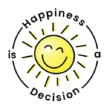As the new year ticked over I was delivered a report detailing different statistics about visitors to my website over the past 12 months. One of the most surprising metrics I read was that 100% of all my website visitors were women!
Whaaat? The first thing that occurred to me when I read this was that not even my husband or son had visited my website for the whole year. But actually, this really didn’t surprise me too much. God love them.
Secondly, I questioned, how do they know that? But considering that most of my website traffic comes from Facebook I guess it isn’t too hard to work out. Note to self, I really need to finish that SEO mini-course to learn how to get more organic traffic.
But the big question that the report left me with is, are men happier than women? Is this why fewer, ok no men, are reading my posts about happiness and/or how to feel more of it? Do they not need it because they are naturally happier?
You could maybe think so just from this single statistic but this is only my little website and definitely not some definitive marker about society. And, checking those types of markers shows a completely different story.
I did a quick check online in relation to suicide rates and was absolutely shocked at the data. Here, take a look at a break down of the 2018 Australian suicide data by age and gender.
Summary of suicide data by age and gender – click to view source
- The rate of suicide among males is more than three times greater than that for females. In 2018, the age-specific rate for males 18.7 per 100,000 (2,320 deaths by suicide) and female 5.8 per 100,000 (726 deaths by suicide).
- Suicide is the tenth leading cause of death for males and the 23rd leading cause for females.
- The highest proportion of suicide deaths occur among young and middle-aged people, while the proportion decreases in progressively older age cohorts. More than half of all suicide deaths in 2018 (54.8%) occurred between the ages 30 and 59.
- In 2018, suicide accounted for over one-third of deaths (38.4%) among people 15-24 years of age and 29.4% of deaths among people 25-34 years of age.
- In 2018, there were 105,730 years of life lost to suicide. On average, a person who died by suicide in 2018 lost 36.7 years of life.
These numbers are staggering. This real-life data shows that men take their own lives three times more than women do. I had no idea when I sat down to write this that the suicide rates are so high for men compared to women. That would then suggest that men are actually three times more MISERABLE than women. So, definitely NOT happier than women as per my original question.
Why is this? And, what relation does it have to my little website report, if any? My gut feeling is that men don’t look to the internet or at any external sources for solutions to their problems or for ways to feel happier. Maybe men think that they should be able to work out their own problems for themselves and not look to outside sources for help or ideas. That is my general feeling as I sit here and write this.
I know that the men close to me, said husband and son, certainly don’t trouble themselves with the opinions of others when it comes to how they live, think and feel. They both hate to be told anything and are excruciatingly independent. I believe that they think that they should be able to work it out for themselves or, that whatever their problems are, they will just work themselves out.
But, as a woman, not that this may have any bearing, I believe that this is flawed thinking. I am constantly looking for outside sources of help and ideas. I know that I can only think what I think and that I need outside stimulus to spark new ideas or solutions. I don’t know what I don’t know and without a new perspective, I am often doomed to spiral through my own thoughts about any issues I have. I know that it can be hard for me to get a spark of inspiration when I am ruminating on a problem and I am often wanting to shortcut the process by looking for solutions that others may have already found.
I’m sure I am not alone in this. As well as looking for a shortcut other reasons for searching for answers online may vary. Sometimes I don’t believe in my own ideas and am looking for external validation or proven alternatives. A lot of the time I am searching Google with a firm faith that the answers are out there and I just have to find them. That is actually giving Google a great deal of power but I think of Google as the receptacle of the collective human intelligence.

This is a very simplistic and totally off the cuff look at the data and my statements are full of generalisations and completely without scientific backup. But that being said, maybe there is a grain of truth in it. I’d love to have a man’s opinion.
And…….. the universe provided. After writing the above I wandered outside for a break and discovered my 28-year-old son and one of our friends, Ben who is in his 30s. I told them about this post that I am writing and asked them, why do you think men are less likely to search for ways to be happier online?
What ensued was a very interesting discussion and both Ben and my son agreed that pride was a huge factor. I asked if that would also be a factor for an online search being that it’s a private kind of thing. It’s not like you’re fronting up to a self-help group or reaching out to a professional. They agreed that it was still a pride thing. My son even used the word humiliation. I was shocked. But Ben summed it up by saying that the problem was about admitting it to yourself. Admitting that you aren’t happy or aren’t coping. It damages the internal sense of pride. Very interesting.
So, to answer my question, I don’t think that men are happier than women. In fact, the numbers actually show that they may be way more miserable than women. And, my minimal experience has me thinking that men are less likely to search for help or answers or ways to increase their happiness from any outside sources.
My question then is, why not? I guess in a way my first instinct about this could be at least partly correct. That men think that they should already have all the answers that they need and should be able to solve any problems they have themselves.
What do you think? Take the polls below.
[yop_poll id=”1″]
[yop_poll id=”3″]
What do you think could be done to help men and lower the shocking statistics on male suicide?
I’d love to hear your ideas. Add your comments below.

